Change by Design
Johannesburg

Change by Design
Johannesburg
Securing Adequate Housing in Inner-City Johannesburg



Editors
Beatrice De Carli, Tamara Kahn
Contributors
Jhono Bennett, Jacqueline Cuyler, Alexandre Apsan Frediani, Lauren Royston
Production
Copy Editing: Beatrice De Carli
Design and illustrations: Ottavia Pasta
Publisher
Architecture Sans Frontières UK
ISBN 978-1-0685485-3-6
How to Cite
Architecture Sans Frontières UK, 1to1 Agency of Engagement, and IIED. The Right to Home: Securing Adequate Housing in Inner-City Johannesburg. Change by Design Johannesburg (London: Architecture Sans Frontières UK, 2025).


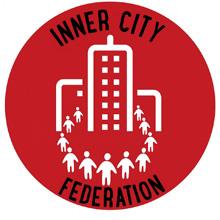
Definitions of the Right to Adequate Housing used in this document have been drawn from:
OHCHR (Office of the United Nations High Commissioner for Human Rights) and UN-Habitat (United Nations Human Settlements Programme), The Right to Adequate Housing – Fact Sheet No. 21/Rev.1 (Geneva: OHCHR, 2009).
Explanations in Part 2 have been informed by:
United Cities and Local Governments (ed.), Housing and Basic Services from Below: How local and regional governments are advancing the right to adequate housing – Local and Regional Governments Report to the 2023 HLPF, Paper 1 (Barcelona: UCLG, 2023).

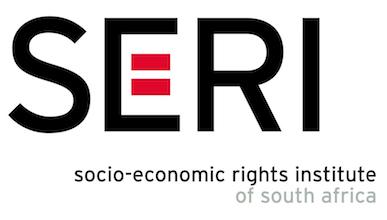

Security of
The Right to Adequate Housing (established by the United Nations Declaration of Human Rights, 1948: Article 25) is defined broadly as “the right to live somewhere in security, peace and dignity”.
This report is part of a series presenting findings from the Change by Design workshop series, which was held in Johannesburg from 2023 to 2025. Led by Architecture Sans Frontières UK (ASF-UK) and 1to1 Agency of Engagement, this initiative champions the right to adequate housing for inner-city residents who face challenges in securing affordable and stable accommodation. Over two years, we have collaborated closely with residents of informally occupied buildings and their support organisations to strengthen grassroots mobilisation and advocacy efforts.
The Change by Design initiative is built on robust partnerships with the Inner City Federation (ICF), the Inner City Resource Centre (ICRC), the Socio-Economic Rights Institute of South Africa (SERI), and the International Institute for Environment and Development (IIED). Further contributions came from several South African and UK universities, including Wits University, the University of Johannesburg, and the University of Cape Town. Through our grassroots partners, we engaged with approximately 150 residents across seven informally occupied buildings over four intensive, one-week workshops. Our goal was to gain a deeper understanding of their living conditions, aspirations, and available options, while also enhancing their advocacy skills and creating useful documentation of the process.
In September 2023, ASF-UK and 1to1 convened a peer-learning workshop in Johannesburg on the Right to Adequate Housing in the inner city. Co-designed with IIED’s Housing Justice team, the workshop brought together community organisers from ICF, ICRC, SERI, and 1to1. Discussions explored the meaning of this right and identified strategies to advance it for residents of informal housing, whether in settlements or in unlawfully occupied buildings.
This publication builds on an earlier report, Our Right to Adequate Housing, extending and illustrating its findings. Like its predecessor, it compiles the key insights emerging from the workshop conversations. By revisiting this work two years later, we aim to situate it within the broader body of reporting from the Change by Design Johannesburg project.

Any text appearing in pink is quoted directly from the United Nations High Commissioner for Human Rights, The Right to Adequate Housing: Fact Sheet No. 21/Rev.1. All other descriptions and interpretations are our own.

Security of tenure
Housing is not adequate if its occupants do not have a degree of tenure security which guarantees legal protection against forced evictions, harassment and other threats.
Availability of services, materials, facilities and infrastructure
Housing is not adequate if its occupants do not have safe drinking water, adequate sanitation, energy for cooking, heating, lighting, food storage or refuse disposal.
Affordability
Housing is not adequate if its cost threatens or compromises the occupants’ enjoyment of other human rights.
Habitability
Housing is not adequate if it does not guarantee physical safety or provide adequate space, as well as protection against the cold, damp, heat, rain, wind, other threats to health and structural hazards.
Accessibility
Housing is not adequate if the specific needs of disadvantaged and marginalized groups are not taken into account.
Location
Housing is not adequate if it is cut off from employment opportunities, healthcare services, schools, childcare centres and other social facilities, or if located in polluted or dangerous areas.
Cultural adequacy
Housing is not adequate if it does not respect and take into account the expression of cultural identity.
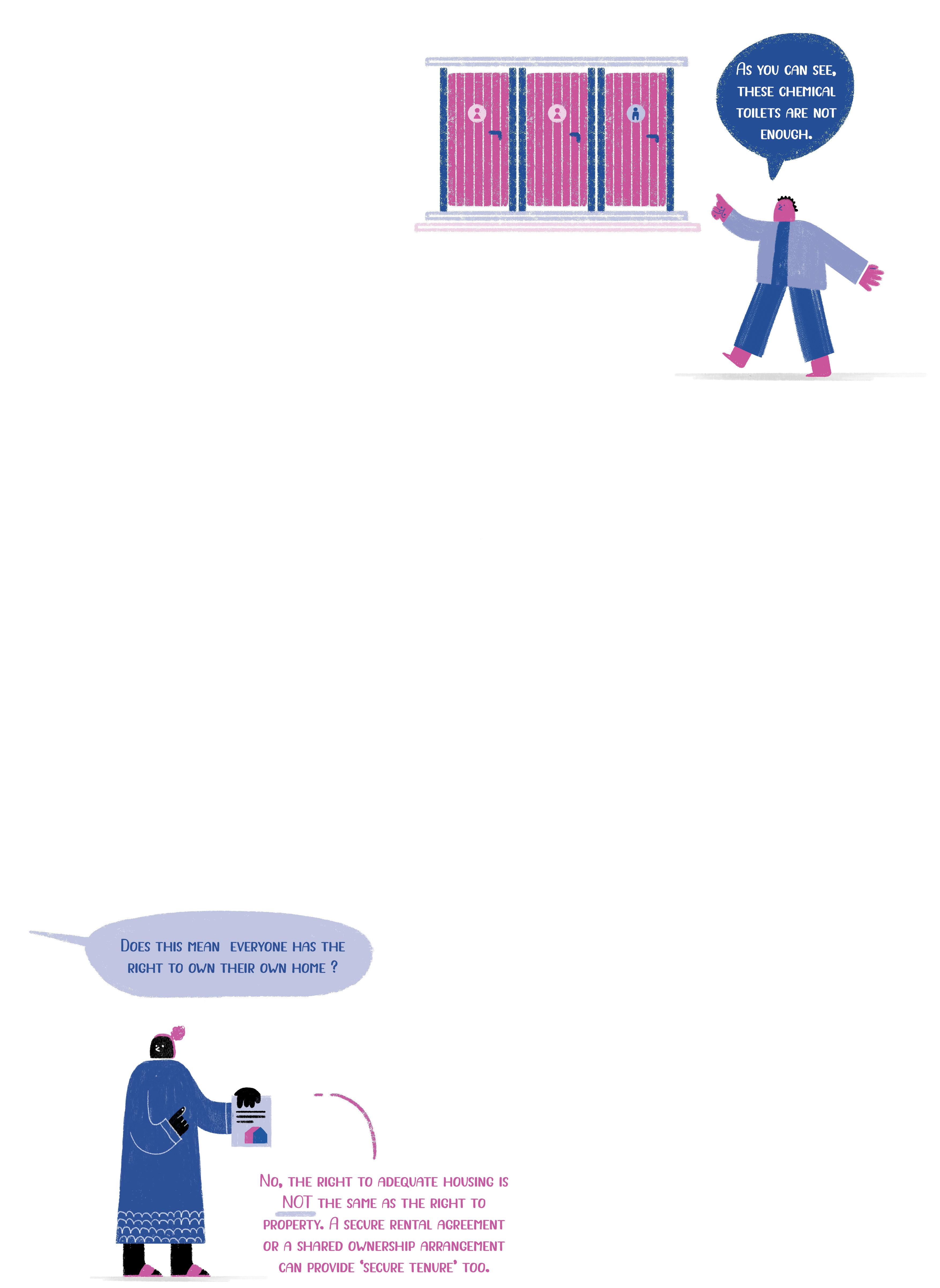
Adequate housing isn’t just about having a place to live. It also means that you should have a place to live where you are protected from unlawful evictions, threats or harassment by the state or by anyone else.
“Our policies protect residents from unlawful evictions, but they are not always enforced.”
“People who live here may have rental agreements, but these agreements may not be recognised by the law.”
“The political or religious affiliation of informal settlement committees or their leaders can affect the level of protection against evictions.”
“It is often unclear if local government will provide adequate housing for residents.”
“Once the land or a building is designated for upgrading, the security of tenure increases, and the chances of being forced to leave become lower.”
“Instead of each person owning their place, we could think about different ways of having a secure place to live, like formal rental agreements, shared ownership, or community ownership.”
Adequate housing includes access to safe drinking water, adequate sanitation, energy for cooking, heating, lighting, food storage and refuse disposal.
“Policy states that a maximum of 5 households should share one chemical toilet, but the council’s provisions are often based on outdated settlement data, resulting in an insufficient number of toilets being provided.”
“In informal settlements, people create their own services like toilets and energy networks. However, these services can be vulnerable to vandalism. To ensure their safety, community safety officers are sometimes put in place to monitor and protect these services.”
“Without adequate services, unsafe energy connections and the use of candles can pose a risk of fire outbreaks.”
“Toilets may not be located in safe places for women and children to use at night.”
“Waste and recycling facilities are often insufficient in informal settlements.”
Housing is not adequate if it is so expensive that it affects other human rights, for example, access to food.
How does this apply to us?
“Rental arrangements may still exist in informal housing, meaning that not all residents in informal settlements are living there free of charge. Informal rental arrangements can be expensive and policies don’t seem to protect those tenants.”
“Unlawfully occupied buildings and informal settlements are often the only affordable housing option in the innercity for people who have jobs or other commitments in Johannesburg.”
“The costs of upgrading occupied buildings to meet the standards of adequate housing can be high.”
“In occupied buildings, a leader or committee may collect payments for self-build repairs or service installations.”
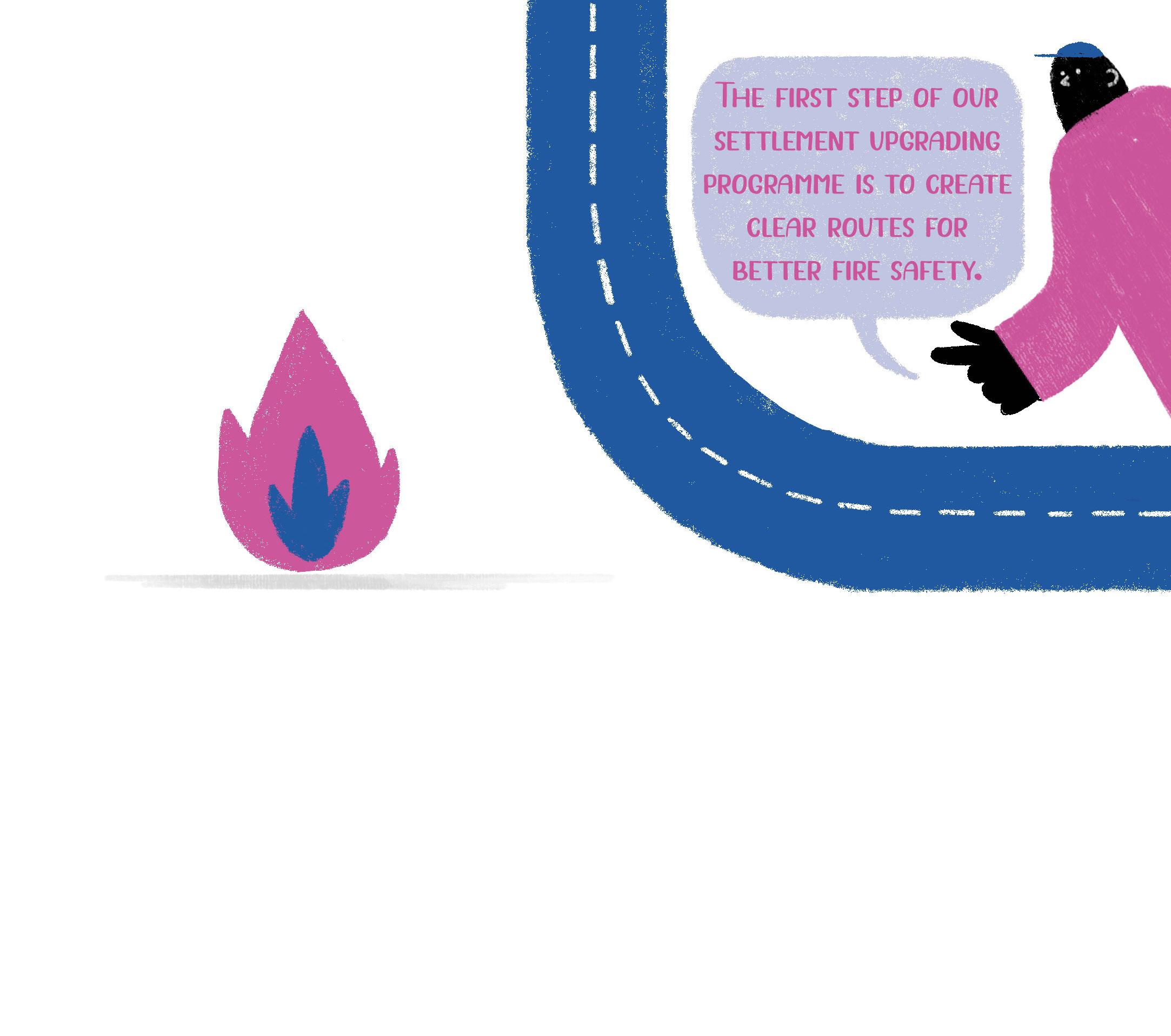
Housing needs to keep you safe, offer enough space and protect you from rain, fire, wind, heat, dampness, cold and other threats to the building or your health.
How does this apply to us?
“Most informal housing does not meet the minimum requirements for habitability and is prone to many risks, like fire, structural instability, and flooding.”

“Until a settlement or building is identified as safe and designated for upgrading, residents may be hesitant to invest in improving their housing structures, such as building walls in brick.”
“The safety of women, children, and older people is often at risk in informal settlements.”
“Greywater and waste are often a health hazard in informal settlements.”
“Lack of space leads to insufficient privacy and no space to store food, especially in occupied buildings and dense inner-city settlements.”
“Community safety officers can offer a higher level of safety and lead to community-led initiatives, such as those paid for by the SEE (Social Employment Fund).”
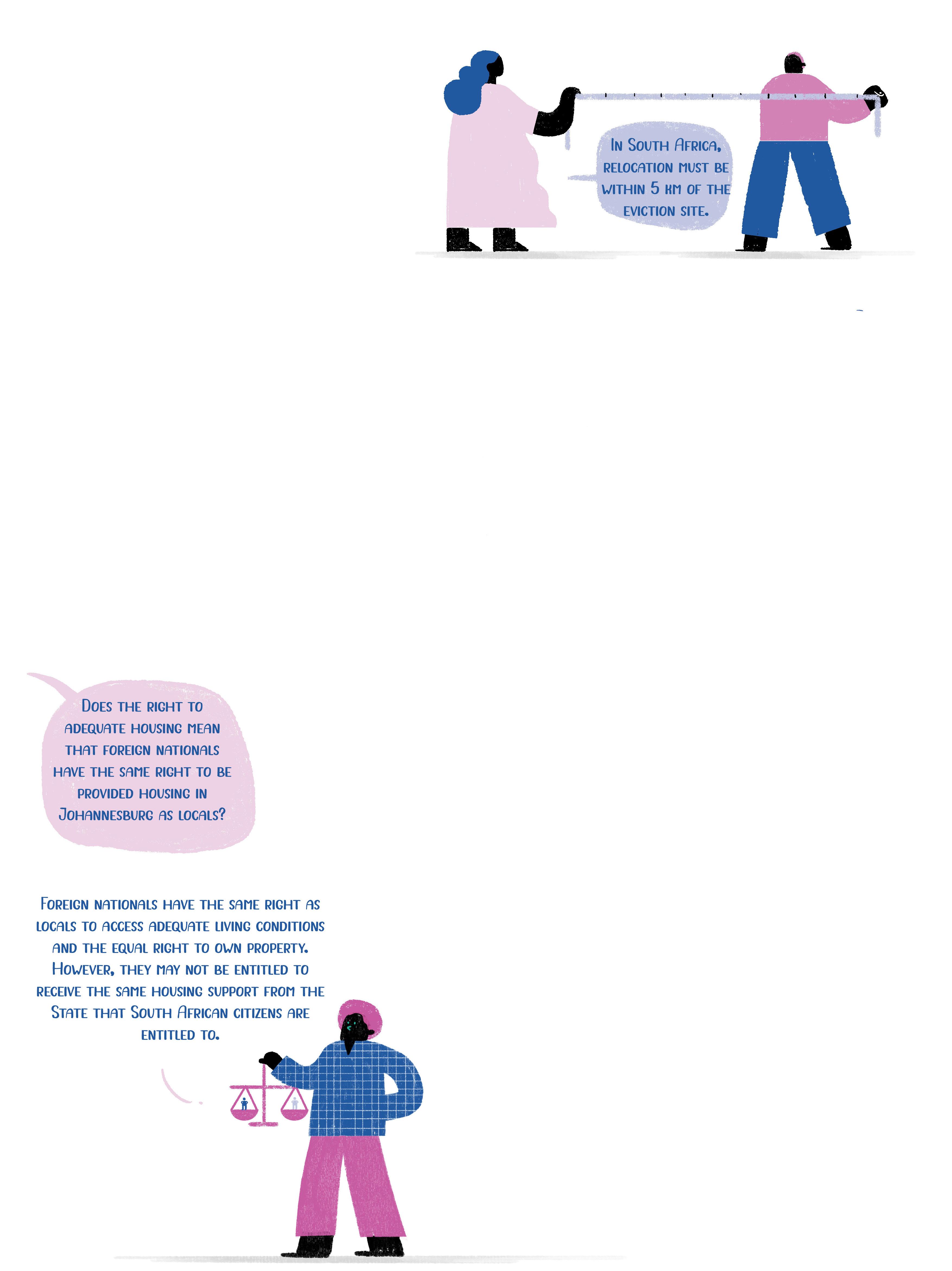
Housing must consider the unique needs of vulnerable and marginalised people, including people with disabilities, elders, children, women, minority groups etc.
“In the settlement where I live, people in wheelchairs and older individuals find it difficult to use government-provided chemical toilets.”
“Sometimes women are forced to engage in sex work to access certain facilities.”
“People with physical disabilities may struggle to evacuate safely in case of a fire.”
“The paths and roads are not accessible for people with walking difficulties.”
“The right to adequate housing for foreign residents, whether documented or undocumented, is often not recognised.”
Housing must be in an appropriate location. It should not cut you off from employment opportunities, healthcare services, schools, childcare centres and other social facilities. Housing must also not be located in polluted or dangerous areas.
“Land available for informal settlements is often contaminated or structurally unstable, for example, due to historical mining activities.”
“Many informal settlements are far from schools. This poses great challenges for residents, especially children.”
“The safety of children in a particular area or around certain buildings can make a location inappropriate for housing.”
“Limited access to play areas is a common issue in informal settlements.”
“Housing within occupied buildings in the inner city is often situated in good locations with easy access to services, shops, and transportation options.”
Housing must respect and take into account your cultural identity.
“Certain areas in a city, such as Jeppe, may serve as meeting points for residents of specific cultures.”
“Council-provided temporary relocation housing often fails to respect the diverse needs of different cultures and religions.”
“Due to the lack of overall space, there are typically no designated areas for social gatherings or prayer.”
“The needs of extended families are often not adequately considered in informal settlements.”
“Residents generally have clear ideas of what ‘cultural adequacy’ would entail for their home, building, or settlements.”


“In housing, discrimination can take the form of discriminatory laws, policies or measures; zoning regulations; exclusionary policy development; exclusion from housing benefits; denial of security of tenure; lack of access to credit; limited participation in decision-making ...

State obligations fall into three categories, namely the obligations to respect, protect and fulfil:
State obligations fall into three categories, namely the obligations to respect, protect and fulfil:
The obligation to respect requires States to refrain from interfering directly or indirectly with the enjoyment of the right to adequate housing.
The obligation to protect requires States to prevent third parties from interfering with the right to adequate housing.
The obligation to fulfil requires States to adopt appropriate legislative, administrative, budgetary, judicial, promotional and other measures to fully realize the right to adequate housing.
National, regional and local policy should respect and recognise the housing rights of people who have been systematically discriminated against, as well as acknowledge housing processes and knowledge beyond the realm of formal planning.
What this could look like in inner-city Johannesburg:
• Recognise occupied buildings as housing opportunities in well-located areas.
• Understand local governance and settlement-specific complexity (for instance, the role of traditional leaders and committees…).
• Understand the experience of the most vulnerable residents (for instance, people with a disability, children, elderly, migrants, people with addictions, and single-parent households…).
• Recognise residents as knowledgeholders and community data as a reliable source of knowledge.
• Recognise the importance of intermediaries/support actors in the process (for example, NGOs, civic groups, private sector or tribal leadership).
• Recognise community assets and the capacity of residents to maintain and manage their own homes.
• Recognise the role of local government to engage with residents meaningfully.
• Recognise when rights are not met and communicate shortfalls in a transparent way.
National, regional, and local governments play a critical role in protecting housing rights by creating rules and incentives that prevent unfair treatment and forced evictions.
What this could look like in inner-city Johannesburg:
• Protect the rights of individuals in unlawful settings (e.g. informal tenants, undocumented migrants).
• Protects the rights of vulnerable residents (for example, people with a disability, children, elderly, people with addictions, single-parent families…).
• Promote a range of options for secure tenure – including both shared and individual forms of tenure.
• Respond to delivery shortfalls identified by residents and their organisations.
• Protect residents from forced evictions without alternative adequate housing.
• Create a safe space for residents to report shortfalls and wrongdoings.
• Create incentives that protect selfprovided improvements (for paid Community Safety Officers that can ensure self-built solar panels are not vandalised or stolen).
National, regional, and local governments are critical to fulfilling housing rights by enabling and directly providing housing units, as well as supporting organised housing groups and co-producing initiatives for informal settlement upgrading.
What this could look like in inner-city Johannesburg:
• Enable the upgrading of unlawfully occupied buildings (i.e. through a Upgrading of Informal Settlement Programme (UISP) for buildings).
• Enable co-production, self-provision and self-help processes (for instance supporting DIY building upgrading, ‘meeting residents halfway’).
• Support residents in collective management and safety provisions (for example, by formalising community safety volunteers).
• Create frameworks for collaboration between different stakeholders: residents, NGOs, private sector and local government.
• Make it simpler to access subsidies when residents are entitled to support.
• Have clear and fair procedures for resident and community organisations to be heard in government-led upgrading processes.
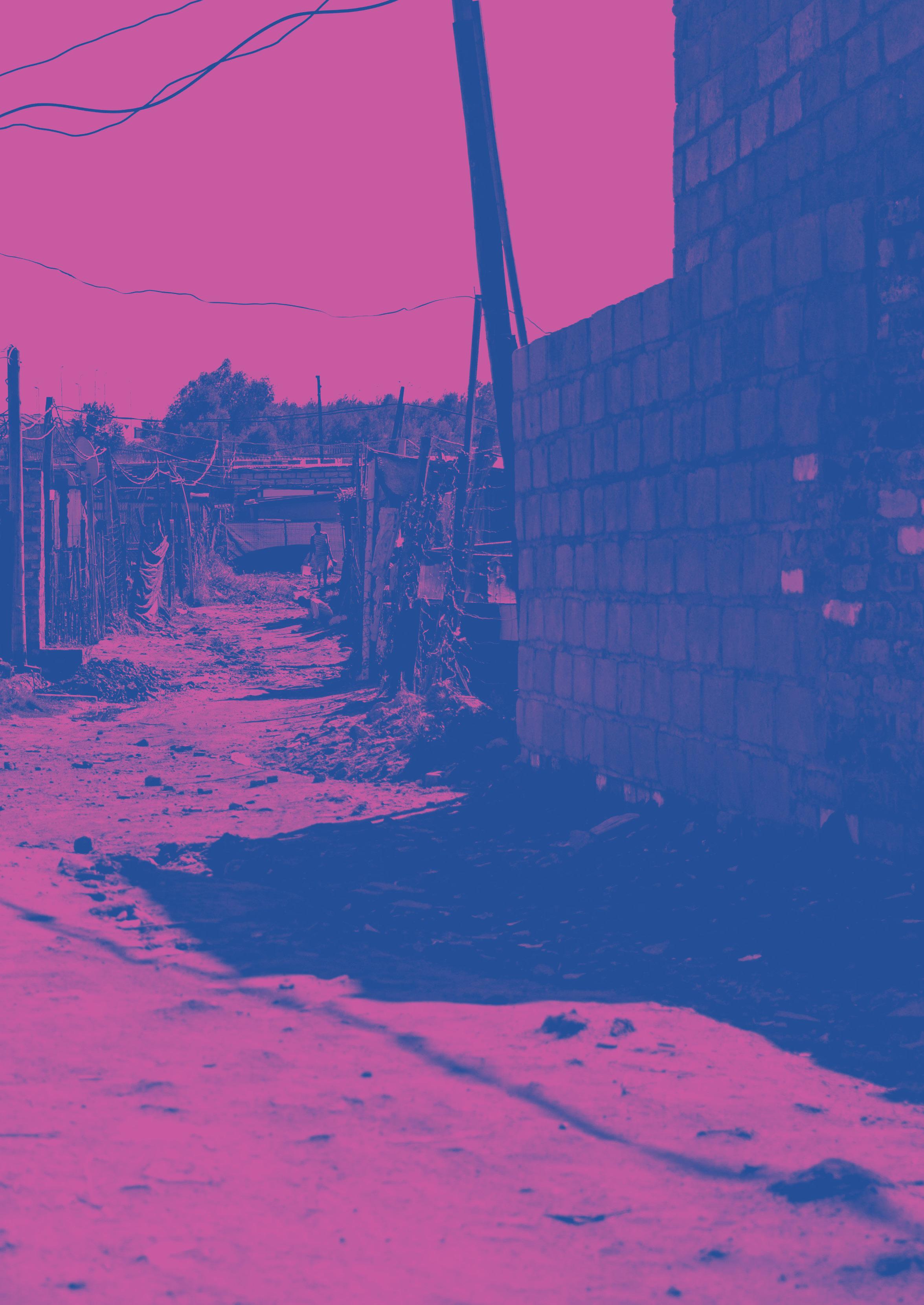
People have the right to be involved in decisions about their housing. If their rights are not respected, they can work with their organisations and support networks to hold the government accountable. This is very important for making sure everyone has an adequate place to live.
However, community groups and civil society actors can do more than highlight what the state is not doing. They can:
Share
Share data and knowledge (Example 1).
Provide
Provide legal support to residents facing illegal evictions (Example 2)
Show
Show examples of community-led upgrading that meet the criteria for adequate housing (Example 3)
Engage
Engage in civic education and building coalitions (Example 4).
Learn
Learn from other places and try out new ideas (Example 5)
Community facilitators from organisations like 1to1 – Agency of Engagement and Planact regularly collect data and information about the settlements they live in. This community-led data collection is especially important when local governments do not have accurate information about a settlement or building or do not share it. Inaccurate information used by government departments and development agencies to make decisions can result in interventions that fail to meet the needs and desires of the people on the ground. When communities have control over the information they collect, they are in a stronger position to start conversations, make demands, and hold governments accountable. By gathering and sharing information about the places where they live, communities can ensure that the government fulfils its obligation to advance housing rights.
Organisations like SERI and ICF provide legal support to residents facing illegal evictions. They may produce guidance documents and represent families in court. They will generally point towards national and international law to ensure the rights of people are being met. By doing this they ensure that the government carries out its obligation to protect the housing rights of its residents. To know more: SERI’s Resource Guides
Organisations such as 1to1 and Planact have demonstrated how communities can lead the way in upgrading their settlements and buildings. The experiences and actions taken during these resident-led upgrades can serve as a foundation for developing formal government processes and policies. When communities take the initiative to improve their living conditions and document their work, it provides valuable lessons that everyone can learn from. Workshop participants suggested that government staff at the depot and national level should become involved in learning from existing resident-led projects so that they are better equipped to work with residents in fulfilling the right to adequate housing.
To improve communication and public involvement in decisionmaking, community organisations can establish partnerships and create frameworks for collaboration with local government officials. An example of such a partnership is the City Learning Platform in Freetown, Sierra Leone. This platform serves as a space for various stakeholders, such as local authorities, NGOs, research institutions, private companies, and informal settlement representatives, to share their experiences, coordinate efforts, and propose solutions for upgrading informal settlements in the city.
To know more: Principles of Engagement the City Learning Platform in Freetown
Sometimes, new and helpful ideas for solving local challenges have been put into practice in other places. International organisations like ASFUK and IIED play a role in promoting learning between different locations. In doing so, the aim is to break down unhelpful local tensions, introduce fresh perspectives, and show that alternative approaches are possible.
For example, in São Paulo, Brazil, housing social movements have successfully tested innovative methods to improve informally occupied buildings with the involvement of residents. In some cases, residents of these buildings have effectively worked with local governments to have their upgraded buildings recognised and supported as social housing. It is important to acknowledge that each situation is unique, and we can’t simply transfer policies and practices from one place to another. However, by understanding and engaging in dialogue with similar experiences, we can imagine new ways to provide adequate housing in inner-city Johannesburg.

(3) No one may be evicted from their home, or have their home demolished, without an order of court made after considering all the relevant circumstances. No legislation may permit arbitrary evictions.
This report presents a selection of findings from the Change by Design workshop series, a multi-year initiative held in Johannesburg from 2023 to 2025. The Change by Design programme is a longstanding initiative of Architecture Sans Frontières UK, while the Johannesburg workshop series was an initiative by ASF-UK and 1to1 – Agency of Engagement.
We extend our sincere gratitude to our collaborative partners: the Inner City Federation (ICF), the Inner City Resource Centre (ICRC), the Socio-Economic Rights Institute of South Africa (SERI), and the International Institute for Environment and Development (IIED). This project was also made possible by the invaluable support of many organisations, including Oskotheni, Planact, and Ndifuna Ukwazi, along with several universities: the University of the Witwatersrand, University of Johannesburg, University of Cape Town, London Metropolitan University, University College London, and the University of Sheffield.
We gratefully acknowledge the financial support of Allford Hall Monaghan Morris (AHMM), without which this publication would not have been possible.
We would like to extend our thanks to the dedicated facilitators from ASF-UK and 1to1 – Agency of Engagement who made this work possible. Our coordinators were Jhono Bennett, Jacqui Cuyler, and Beatrice De Carli, who were joined by Nick Budlender, Kathryn Ewing, Tahmineh Hooshyar Emami, Tamara Kahn, Rowan Mackay, Sifiso Mtimunye, Francesco Pasta, and Valentina Riverso.
We are also incredibly grateful to the workshop participants for their invaluable contributions:Ana Muñoz Antuña, Clare Chappel, Lucy Olivia Earle, Shannon Fisher, Veronica Frederico, Oana Gavris, Noluthando Geja, Nomvuzo Gingcana, Florence Gule, Monica Hassamo, Jinty Anne Jackson, Nubumbi Kabongo, Bevil Lucas, Siyabonga Mahlangu, Gcina Malandela, Zainab Al Mansour, Marcelle Mardon, Giacomo Martinis, Percy Masango, Dumisani Mathebula, Harriet McKay, Angelique Michaels, Balungile Mntaka, Hiba Mohamad, Muhammad Moola, Bonginkosi Ndlovu, Lizwelthu Ndlovu, Ebenezer Kofi Okyere-Dede, Giulia Peruzzo, Julia Phora, Retsepile Rammoko, Lauren Royston, Suraya Scheba, Marika Searle-Krokidas, Sabine Surkan, Itumeleng Tlokotsi, Cornelia Busiswa Tsibiyana, Katarzyna Wardach, Diana Zambelloni, Sifiso Zuma.
A special thanks goes to the many guest speakers who generously shared their knowledge of the inner city, particularly Heather Dodd, Althea Peacock, and Matthew Wilhelm Solomon. Heather Dodd’s work was an especially important source of inspiration for our efforts in documenting occupied buildings from an architectural perspective, which greatly informed our workshop discussions and outputs. We are also grateful to the friends and collaborators who attended our public sessions, as their thoughtful contributions were invaluable in helping us explore the complexities of life in inner-city Johannesburg.
Our deepest gratitude goes to the leadership and representatives of the Inner City Federation and the Inner City Resource Centre for guiding us through the inner city, and to all the residents who entrusted us with their life stories. We hope this publication serves as a useful tool in your ongoing struggle.

Change by Design Johannesburg is a collaborative initiative led by ASF-UK and 1to1 Agency of Engagement. Since 2023, we have been working alongside residents and community organisations in inner-city Johannesburg to advocate for community-led solutions for adequate housing.
Architecture Sans Frontières UK (ASF-UK) is a non-profit organisation working to transform cities through community-led design and planning. We amplify the voices of those most affected by urban change, building collective power for more just and sustainable cities.
www.asf-uk.org
Architecture Sans Frontieres-UK
@ asf_uk